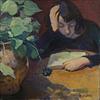You need to sign in or sign up before continuing.
Take a photo of a barcode or cover
dark
funny
medium-paced
Plot or Character Driven:
Character
I've always felt and wanted to love Isaac Babel but then always get bogged down in his stories and sketches. This was my first time reading Odessa Stories and I absolutely loved the first several of them which centered around a (fictional) Jewish gangster named Benya Krik and had a real energy and humor with great dialog and a nice nobility among thieves. After the Benya Krik stories the rest were sketches that captured the Odessa of a century ago in a somewhat interesting manner but they were more depictions than short stories with an emotional or psychological insight, a plot, or real development. Still enjoyable but not nearly as thrilling as the first few stories.
adventurous
funny
informative
lighthearted
medium-paced
funny
sad
medium-paced
Plot or Character Driven:
A mix
Strong character development:
No
Loveable characters:
N/A
Diverse cast of characters:
N/A
Flaws of characters a main focus:
Yes
it takes a lot to make me laugh when reading but this made me chortle multiple times
Graphic: Murder
Moderate: Sexism, Antisemitism, Sexual harassment
Perhaps more of an experience - it's certainly not just a collection of short stories. It reminded me of a collection of Russian fairy tales I read when I was 8 or so; there's a level of unreality mixed with that universal structure that satisfies our storytelling brain that fairy stories employ. I'd recommend with the caveat that it's not easy reading.
I received an ecopy from the publishers and NetGalley in exchange for an honest review.
I received an ecopy from the publishers and NetGalley in exchange for an honest review.
Todella hyviä novelleja alusta loppuun. Babelin novellit ovat lyhyitä ja tuokiokuvamaisia ja niistä välittyy vahvana näkemys hänen lapsuutensa Odessasta/odessalaisista, etenkin juutalaisten kaupunginosasta Moldavankasta.
Babelin tarinat ovat inhorealistisia ja humoristisia, omaa kansaansa juutalaisiakaan hän ei pilkalta juuri säästele. Venäläisen tarinan tapaan pieneenkin novelliin mahtuu paljon hahmoja. Ajan tapahtumat näkyvät myös vahvana.
Todella vahva suositus.
Babelin tarinat ovat inhorealistisia ja humoristisia, omaa kansaansa juutalaisiakaan hän ei pilkalta juuri säästele. Venäläisen tarinan tapaan pieneenkin novelliin mahtuu paljon hahmoja. Ajan tapahtumat näkyvät myös vahvana.
Todella vahva suositus.
lighthearted
medium-paced
Plot or Character Driven:
N/A
Strong character development:
N/A
Loveable characters:
N/A
Diverse cast of characters:
N/A
Flaws of characters a main focus:
N/A
This Pushkin Press edition brings together all of Isaac Babel’s stories with an Odessa setting, in a new translation by Boris Dralyuk. Dralyuk also provides a helpful introduction which explains the context of the stories and gives insights into his approach to the translation. We learn, for instance, that at the start of the 20th century Odessa had the largest Jewish settlement after New York and Warsaw, counting around 140,000 Jews. The community had also its seamier underworld, largely based in the area of Moldavanka. This part of the city, which Dralyuk compares to London’s Whitechapel or New York’s Lower East Side, led to the development of what one might call Odessa’s “urban folklore”, peopled by gangsters at once reviled for their violence and revered for their roguish charm and peculiar code of honour.
The first part of this volume of stories is entitled “Gangsters and other Old Odessans” and includes tales inspired by this “urban folklore”. They feature recurring characters – such as Benya “the King” Krik, Froim “the Rook” and Lyubka “the Cossack”. I must confess that I did not find these criminals particularly likeable, nor did I warm to their dubious exploits. Whatever my feelings about his protagonists, however, there’s no denying Isaac Babel’s brilliance as a writer. His style is very particular, alternating dark humour with lyrical passages inspired, according to Dralyuk, by the argot of Odessa. It must have been a particular challenge to capture the flow of the originals in this English translation, but Dralyuk manages to do so effectively by drawing, believe it or not, on the style of American pulp fiction contemporary with Babel's stories.
The gangster tales are complemented by a number of autobiographical works, grouped under the title “Childhood and Youth”. These vignettes reflect Babel’s Odessan upbringing, but they are an imaginative interpretation of his childhood impressions, rather than a memoir. You could call it autobiographical fiction, or fictional autobiography - or, to use a current term, auto-fiction. Three pieces which could not be comfortably placed under either of these two sections are placed in a final part - "Loose Leaves and Apocrypha."
This is a collection to read, both for the quality of its stories and for the snapshot it gives of the Jewish community of Odessa at a particular point in time. Here was a world which would soon change forever.
The first part of this volume of stories is entitled “Gangsters and other Old Odessans” and includes tales inspired by this “urban folklore”. They feature recurring characters – such as Benya “the King” Krik, Froim “the Rook” and Lyubka “the Cossack”. I must confess that I did not find these criminals particularly likeable, nor did I warm to their dubious exploits. Whatever my feelings about his protagonists, however, there’s no denying Isaac Babel’s brilliance as a writer. His style is very particular, alternating dark humour with lyrical passages inspired, according to Dralyuk, by the argot of Odessa. It must have been a particular challenge to capture the flow of the originals in this English translation, but Dralyuk manages to do so effectively by drawing, believe it or not, on the style of American pulp fiction contemporary with Babel's stories.
The gangster tales are complemented by a number of autobiographical works, grouped under the title “Childhood and Youth”. These vignettes reflect Babel’s Odessan upbringing, but they are an imaginative interpretation of his childhood impressions, rather than a memoir. You could call it autobiographical fiction, or fictional autobiography - or, to use a current term, auto-fiction. Three pieces which could not be comfortably placed under either of these two sections are placed in a final part - "Loose Leaves and Apocrypha."
This is a collection to read, both for the quality of its stories and for the snapshot it gives of the Jewish community of Odessa at a particular point in time. Here was a world which would soon change forever.
adventurous
dark
funny
Plot or Character Driven:
A mix







